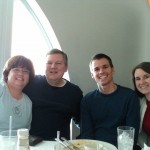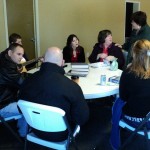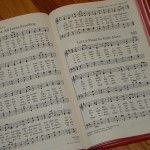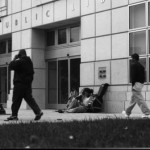A Pilgrim’s Community
My friend Eric at “A Pilgrim’s Progress” is writing a series about why he prefers “house church.” Many of his posts would be applicable to churches that meet in any kind of building – although I agree with Eric that houses (or at least a smaller, more intimate venue) more readily allow for some things.
For instance, in the latest post in the series, Eric writes about “House Church – Seeking Community.”
He writes:
With Jesus Christ as its head, the church seeks to live in community with one another. The people truly desire to share in each others lives. This is much more than surface level relationships; I’m instead talking about Christians acting like family – real brothers and sisters. This, of curse, can get messy because people’s lives are messy. However, it is also wonderful because we can know so much better how to build one another up in Christ.
Later, after listing several passages of Scripture concerning our relationships with one another, Eric cautions:
In order to live in community the church needs to do more than meet once per week. The one anothers should be happening all the time. As Christians, we should all be striving for this.
To me, this last statement is key. If you are only spending time with your brothers and sisters in Christ one day out of the week, then you will not develop the kinds of relationships that you need (regardless of the venue in which you are meeting). Instead, we must make efforts (or “we should all be striving for” to use Eric’s language) to spend time with one another often.
Or, as the author of Hebrews puts it: Exhort one another daily. (Hebrews 3:13)
(By the way, that’s not Eric in the picture. That’s my wife and me hanging out with a couple of friends.)
Cullmann on “The Aim of the Service”
In my study of the early church (between the time of the apostles to the middle ages), I’ve started reading Oscar Cullmann’s classic Early Christian Worship (London: SCM Press, 1953).
So far, Cullmann continues to call the church gathering by the term “worship” or the phrase “service of worship.” You’ll see the terms used below.
But, pay close attention to what Cullmann says about the “aim” of this “service of worship”:
The Aim of the Service
We are now familiar with the various elements of the service of worship in early Christianity. They are extraordinarily numerous, and it is astonishing how many forms the life of worship in these first Christian communities has assumed. In the light of this wealth of form, we must assert here and now that the services of worship in the Protestant Churches of our own era are very much poorer, not only in respect of the free working of the Spirit, but also in respect of what is liturgical and especially in respect of what is aimed at in the gatherings of the community. The aim is constantly described by Paul as building up of the community (1 Cor. 14). We must not interpret this word in the hackneyed pietist sense of ‘uplift’, but we have to think of the figure of the body of Christ, which must be formed effectually in the community. All the different elements which we have examined individually are subordinated to this purpose, which attains its peak in the ‘coming of Christ’ in the Lord’s Supper. To this aim is due the wealth and the variety of the elements in the early Christian service. But, on the other hand, in view of this aim their use is constantly brought under examination and, if necessary, limited. Paul has also seen this second necessity; he has recognized the danger of this wealth, but he has not thrown out the baby with the bath water. On the contrary, he has preserved everything which can contribute to the ‘building up’ of the body of Christ. (pg. 26)
What do you think of Cullmann’s statement?
Building something that lasts?
I was talking with a friend recently about the people who are part of the church with us. If you remember, several people moved out of the area last summer. Also, there are several families who are looking for jobs or who are considering moving for other reasons.
My friend asked me if I was concerned that if more and more people move out of the area, then our church might cease to exist.
This questions took me by surprise, because I honestly had not even thought about it. Why? Because I don’t think about the church in that way anymore.
You see, if the people are not meeting together, then the church does cease to exist. Of course, organizationally, something called “Messiah Baptist Church” (what we all ourselves) might still exist, but the church – that is, the people who are meeting together – will not be meeting together any longer.
Let me give you an example. Let’s assume, for this example, that exactly 50 people and only those 50 people meet together. Let’s also assume that these people all themselves “Our Community Church.” Not, what happens if those 50 people all stop meeting together as the church (for various reasons), but 50 different people now meet together and continue to call themselves “Our Community Church.”
Even though the new group calls itself by the same name, it is a different group of believers. The church is different. It is not the same. In fact, since none of the same people remain in the second group, “Our Community Church” is now a completely different church.
However, many believers and churches are spending time, energy, and resources to make sure that the organization (whatever they call themselves, however they are organized, whatever their creed or confession, wherever they meet) continues after the people are gone. They are building into an organization.
Our focus should be building into the lives of people. Thus, as I see it, when those 50 people disperse, the church continues through the lives of those 50 people, not through the continuing organization.
Even now, there are people around the world who have spend time with me and my family, who have helped us grow in Christ, and who we have helped in turn. Dispersal of a group of people – while always painful if the people are truly a church in the scriptural sense – can be very good for the kingdom of God.
So, after thinking for a while, I told my friend, “No, I’m not concerned with whether or not ‘Messiah Baptist Church’ continues to exist if all the people move away. However, I am concerned that the people involved continue to proclaim the gospel, build up other believers, and serve people that God brings into their lives. In this sense, the church will continue, wherever we are and whatever we are doing.”
Theology and community? What’s this world coming to?
Apparently, Arthur at “The Voice Of One Crying Out in Suburbia” wants both orthodoxy and community. He says so in his post “In Praise of Orthodoxy and Community.”
He writes:
Solid grounding in the great theological truths of our faith and genuine community and fellowship among believers are not enemies. In fact, without both being present the church is naturally weaker. The evidence all around us bears that out. Cold and sterile academic orthodoxy coupled with ritualistic “fellowship†is spiritually crippled as is warm and loving fellowship among believers who cannot discern the core essentials of the faith. I love doctrine and theology. I have no interest in a gathering of the church where the big topics are never wrestled with and studied, where there is lots of talk about loving Jesus with no concept of who He is. I also love the people of God and have no interest in a sterile meeting where a theologically precise monologue is the spiritual highlight of the week and where we love the dead theological giants of yesteryear more than the widow and the orphan in our neighborhood. My desire is to see my brothers and sisters in Christ develop a love for theology and develop a love for one another, that we seek in Scriptures what it has to say about God, about man, about Christ and that we do so in a Scripturally sound community of faith as the adoptive family of God.
Doesn’t Arthur know that only the conservative churches care about orthodox doctrine and only the liberal churches care about community? He can’t have both. Can he?
A natural meal with a supernatural family
Three years ago, I wrote a post called “A natural meal with a supernatural family.” Today, when we think about “the Lord’s Supper” or “Communion” or “the Eucharist,” we tend to picture a supernatural meal. But, in the pages of the New Testament, the meal was a common (ordinary) meal. However, this common meal was now shared by a new kind of family – a supernatural family. I hope you enjoy this post.
——————————————————-
A natural meal with a supernatural family
Scripture tells us that on the day of Pentecost three thousand people were added to the church. As they began to learn what it meant to be God’s people, some things about their lives changed, while other things remained the same. They continued to eat normal food; but the context of those meals changed:
And day by day, attending the temple together and breaking bread in their homes, they received their food with glad and generous hearts… (Acts 2:46 ESV)
Every day, or at least regularly, the believers met together in their homes to share their food with other people. Family meals were very normal. The meal itself had not changed. But, the family was now completely different.
Of course, this relationship change had be described earlier by Jesus. His disciples were simply following his lead:
While he was still speaking to the people, behold, his mother and his brothers stood outside, asking to speak to him. But he replied to the man who told him, “Who is my mother, and who are my brothers?” And stretching out his hand toward his disciples, he said, “Here are my mother and my brothers! For whoever does the will of my Father in heaven is my brother and sister and mother.” (Matthew 12:46-50 ESV)
Jesus instituted a new family – not created by bonds of flesh and blood, but created by bonds of Spirit and faith. The new followers of Jesus did not merely accept this theoretically and then go on with their lives as usual. Instead, their new brothers and sisters became part of their lives, sharing everything with them – from the most extraordinary to the most ordinary. They shared their possessions, their meals, their time, their very lives. The meals that they shared were quite ordinary – natural meals. But, the family with whom they shared these meals was extraordinary – a supernatural family.
To do this, we have to be willing to open up time in our busy schedules for other people – to be willing to spend time with brothers and sisters that we may not know very well so that God can bind us together through his Spirit. It means that we will need to go to baseball games and dance reviews and award nights and picnics and vacations that are important to our brothers and sisters. We will need to consider them before we consider ourselves – which is almost impossible to do. It means we may need to turn off the TV or put down the book or open up our “family night” in order to invite in our true family – brothers and sisters who have been adopted into God’s family together with us.
During this time of Christmas, it is normal for us to spend time with our natural families. But, what about your supernatural family? Share your time and some meals with your supernatural families as well. And, when you do, share some of your experiences with us here. Let’s celebrate natural meals with supernatural families together!
Missing Hymns
I’ve been thinking about this for quite some time, but I realized recently that I’ve never written about it. What is the “it” that I’m talking about? Missing hymns and songs.
You see, according to Scripture, there are several directions of focus for someone who is following Jesus. We are to focus on God. We are to focus on ourselves. We are to focus on other believers in community. And we are to focus on the nations (those without Christ).
As I see it, the hymns and songs that I know primarily help us with the first two focuses: God and ourselves. Most of these songs point toward our need for God and our individual relationship with God.
There are a few songs that help us focus on our responsibility to take the gospel to and serve the nations and those who are not believers.
But, there are very, very few songs that help us focus on our relationships and responsibilities toward one another in Christ.
(Perhaps, since most people get their theology from their songs, this is one explanation of the individualism rampant in today’s church – or perhaps its a symptom.)
Do you know any songs/hymns that help us focus on community in Christ?
Two Posts on Leadership
Recently, I’ve read two very good posts on leadership among the church:
Eric at “A Pilgrim’s Progress” wrote a post called “‘Leader’ or ‘Leaders’.” In the post, Eric recalls a conversation with another believer about leadership. Eric determined that while they were both talking about “leadership,” they were actually talking about completely different things:
After a few minutes, I realized that we were saying two very different things. While my friend repeatedly used the term “leader,” I kept saying “leaders.” This may at first seem like a small difference, but in reality it is a large one.
I know that my friend believes in strong pastoral leadership. In particular, the “senior pastor” must lead the church as it strives to follow Christ. Therefore, when he says “leader,” he is referring to the senior pastor. I, on the other hand, was saying “leaders” because I was envisioning people within the church (both elders and non-elders) who lead through servanthood and holiness of living. They lead by example.
Scot from “Jesus Creed” wrote another post about leadership called “A Leadership Rant” for “Slant33.” The author (like me) does not like leadership books. Why? He says most of them begin with cultural forms of leadership and then justify it from Scripture. What type of “leadership” does Scot prefer? He explains:
So I want to put my idea on the line and see where it leads us. We have one leader, and his name is Jesus… Instead of seeing myself as a leader, I see myself as a follower. Instead of plotting how to lead, I plot how to follow Jesus with others. Instead of seeing myself at the helm of some boat—and mine is small compared to many others—I see myself in the boat, with Jesus at the helm.
These views of leadership are certainly different than what we usually see in today’s culture or even in today’s church.
What do you think?
Through the eyes of the homeless
Have you ever wondered what the homeless (and others in need) think about our theological discussions, arguments about the Bible, and other “churchy” stuff?
Yesterday, I reviewed Under the Overpass by Mike Yankoski. In the book, Mike tells the story of how he and Sam lived as homeless people on the streets of six cities over 5 months. Mike and Sam are both 20-something Christian men. But, in the book, we get a glimpse of what the homeless see of us (even from a Christian perspective).
Here is one excerpt:
Suddenly a young family came into view. The dad – dressed in t-shirt, shorts, and a baseball cap – walked in front, but he was looking down, evidently listening to his wife. She came along behind pushing the stroller. As they rolled up to us, a small boy in the stroller looked out at me.
When you’re sitting on a sidewalk, you’re at eye level with babies and kids… While kids might pretend people who don’t exist do, it’s the parents who pretend that unwanted people who do exist don’t.
I held the boy’s gaze for a while and gave him a smile, which he immediately returned. From high above him, his mother said something that caught my attention. “We have to be about the gift of giving and the wisdom of the Holy Spirit,” she said.
I looked up quickly, wondering what those words might mean, what with us sprawled on the sidewalk not five feet from her. But when I caught her eye, she looked away and quickened her pace.
Now the family was well past us. But the boy in the stroller still looked straight at me… (p. 55-56)
And, here’s another excerpt:
Although Sam and I spent every Sunday morning at a church somewhere on our travels, the lack of community was taking a toll on us. Even at church, we felt isolated because of how we looked, how we smelled, and who people perceived us to be. In fact, walking into a church where we hoped to find genuine fellowship only to be met by condescension or suspicion or disingenuous flattery was the worst kind of rejection. (p. 150-151)
I hope these excerpts (and the entire book if you choose to read it) will spur all of us on to noticing the people around us, and then spending time with the people we see.
Community and Trials (addendum)
I’ve been thinking about my previous post “Community and Trials.” My friend Dan was honest enough to admit that when he and his wife were going through some difficult circumstances, he did not want people around him. Instead, he said that he wanted to shut out everyone except his immediate family.
It is difficult to welcome people into our lives when things are messy or painful. I’m not exactly sure why this is. But, I’ve experienced it in my own life (from the inside and the outside).
How about you? Have you ever been through a time in your life when you did not want to let other people know what was going on, or you did not want other people to help? Did anyone break through your barriers? Was that helpful or not?
Have you ever been in a difficult time in your life in which you wanted people to come into your life? Did they? Were they loving and accepting or condemning?
Community and Trials
My friend Dan (from “The Ekklesia in Southern Maine“) and his wife Stephanie are going through some very difficult circumstances. They have both written about this, and the posts are extremely honest, open, and encouraging.
For example, Dan wrote a post called “Thank You” explaining how this struggle helped him understand his own desire and need for community. Dan honestly writes:
As time passed and things started to work out I was really convicted about the way I had shutdown from everyone outside of our home during this time. I thought a lot about how in reality, despite all my big talk and big theology the truth is that when it mattered I didn’t want community, I wanted to be left alone. Those thoughts and struggles got me feeling pretty hypocritical about everything I had been writing so I stopped writing and haven’t even looked at my blog in over a month.
If we’re honest with ourselves, we can all join Dan in admitting that we are hypocritical at times. It is difficult to allow people into our lives when our lives are in a mess.
Meanwhile, Stephanie has also written two very powerful posts on Dan’s blog: “October 20th: a guest post” and “The Aftermath: a guest post.” Stephanie is also very open and honest about her struggles and about the particular incident that is the basis of the current trial.
I’m not going to quote from either of Stephanie’s posts, but I encourage you to read them both (and share them with people who may have similar struggles).










